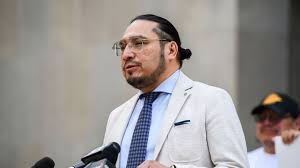Truth and Reconciliation day should be paid provincial holiday: Ontario MPP
The day is a federal statutory holiday, but not a provincial one in Ontario.

Ontario’s sole First Nations representative at Queen’s Park is preparing to introduce legislation, in his own Indigenous language, to declare the National Day for Truth and Reconciliation a paid provincial holiday.
While the day is a federal statutory holiday, it is not yet recognized as such in Ontario.
Sol Mamakwa, New Democrat deputy leader and representative for Kiiwetinoong in northwestern Ontario, is pushing for the province to follow the federal government's example. He hopes Premier Doug Ford’s Progressive Conservatives will back the initiative.
“It’s often First Nations who take the day off and engage in reconciliation, but it’s important for all Ontarians to take that day to reflect, mourn, and learn about the true history of residential schools,” Mamakwa said in an interview.
The National Day for Truth and Reconciliation acknowledges the abuse endured by Inuit, First Nations, and Métis children at hundreds of residential schools operated by the state and church across Canada. Currently, the day is a statutory holiday for federally regulated workers and is recognized in some provinces, like British Columbia.
The day evolved from Orange Shirt Day, launched in 2013 and inspired by Phyllis Webstad’s experience. At six years old, when she arrived at a residential school in 1973, the orange shirt her grandmother had given her was taken away.
Mamakwa, himself a residential school survivor, has personally witnessed the trauma inflicted by these institutions. He plans to table a private member’s bill in November to advocate for a provincial holiday.
“There’s nothing wrong with it—it’s simply the right thing to do,” said Mamakwa, from Kingfisher Lake First Nation. “It should be more than just a day of reflection or mourning; all Ontarians should have the day off to learn about Orange Shirt Day, truth, and reconciliation.”
Greg Rickford, Ontario’s Minister of Indigenous Affairs, expressed reservations about Mamakwa’s proposal but did not rule it out.
“We haven’t reviewed the legislation, so we don’t want to jump to conclusions,” Rickford said in a statement. “I’m not entirely convinced that making it a holiday is the best way to honor the day.”
Rickford noted that some First Nations leaders believe a statutory holiday may not be the right approach at this time, preferring a focus on education about residential schools and efforts to return the remains of children who never made it home.
“Further consultation with First Nations communities, survivors, and leaders is essential to ensure any decisions align with priorities for meaningful recognition,” Rickford said.
Around 150,000 First Nations, Inuit, and Métis children were forced to attend residential schools, the last of which closed in 1996. An estimated 6,000 Indigenous children died in these institutions, although many experts believe the true number is higher. The National Centre for Truth and Reconciliation has recorded more than 4,000 names of children who perished.
Many schools across Ontario currently observe the National Day for Truth and Reconciliation by encouraging students to wear orange shirts and teaching them about residential schools. These educational efforts often extend throughout the year.
Mamakwa plans to present his bill in Anishininiimowin, or Oji-Cree, marking only the second time the language will be spoken in the Ontario legislature. The first was earlier this year when Mamakwa made history by being the first to speak in a language other than English or French in the legislative chamber.
Previously, Ontario’s legislature did not permit the use of or transcription of languages other than English and French. Mamakwa collaborated with former government house leader Paul Calandra to amend the rules to include Indigenous languages spoken in Canada.
A provincial statutory holiday, Mamakwa believes, would represent another step toward reconciliation.
“When we talk about this legislature and this government, that would be reconciliation,” he said. “That’s the path forward, the route to reconciliation—and we need to walk it.”





